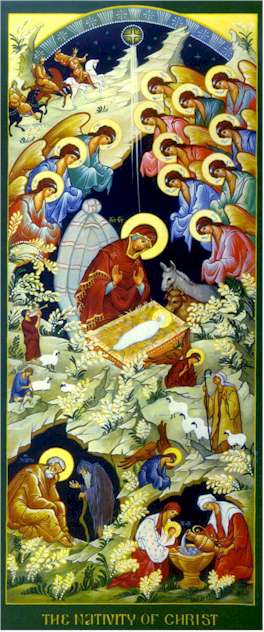
The Nativity Fast begins this year on Tuesday, November 15. This fast helps us prepare to properly celebrate our Lord’s nativity in the flesh and it is to our benefit to observe it as fully as possible.
Following are the guidelines for this fast, according to the general practice of All Saints parish and as approved for publication by Fr. David Winn.
These guidelines are general. Fasting is a spiritual discipline that should be practiced with the oversight and direction of your spiritual father. You should consult your spiritual father if you have any specific questions about the fasting discipline as it applies to you.
Remember that almsgiving is a special part of this particular fast. Futher, limiting one’s entertainments and increasing other aspects of one’s spiritual life–prayer, reading of the Bible and Church Fathers, attendance at Divine Services–is a part of every fast.
THANKSGIVING DAY–Our bishops have decreed that the faithful of the Antiochian Archdiocese in the USA may relax the fast entirely to observe the Thanksgiving Day national celebration, which falls on November 24 this year.
GENERAL GUIDELINES FOR THE NATIVITY FAST 2022
MONDAYs, WEDNESDAYs, and FRIDAYs of this fast are Strict Fast days. On these days we abstain from meat, dairy, fish with backbones, fowl, alcoholic beverages, and olive oil.
TUESDAYs and THURSDAYs of the fast are Wine and Oil days. On these days the fasting discipline is relaxed a bit to permit wine and olive oil.
SATURDAYs and SUNDAYs of the fast are Fish, Wine, and Oil days. On these days the fast is relaxed even more to permit fish with backbones in addition to wine and oil.
During the forefeast of the Nativity, from December 20-24, our fasting is more strict. Each weekday that falls during this period is generally kept as a Strict Fast day, while any Saturday or Sunday is observed as a Wine and Oil day. The Eve of the Feast, December 24, however, is always kept as a Strict Fast day.
Foods that are permitted on all days are vegetables, fruits, grains, nuts, and shellfish.
EXCEPTIONS
The fasting discipline varies from the general guidelines noted above according to the commemoration of the day.
The feast of the Entrance of the Theotokos into the Temple, November 21, is always kept as a Fish, Wine, and Oil day, no matter what day of the week it falls on.
In addition, when the following days fall on a Monday, Wednesday, or Friday, they are kept as Wine and Oil days due to the commemorations observed on such days:
- NOV 25 – Great-martyr Katherine of Alexandria
- NOV 30 – Apostle Andrew the First-called
- DEC 04 – Great-martyr Barbara of Heliopolis/St. John of Damascus
- DEC 05 – Savas the Sanctified
- DEC 06 – Nicholas the Wonder-worker, Bishop of Myra in Lycia
- DEC 09 – Conception of the Theotokos by the Righteous Anna
- DEC 12 – Spyridon the Wonderworker
- DEC 13 – Herman of Alaska
- DEC 20 – Hieromartyr Ignatius of Antioch, the God-seer
Please remember that abstaining from food during this period of preparation does us no good if we do not also, as St. John Chrysostom teaches us, fast with
… the eye and the ear and the feet and the hands and all the members of our bodies.
Let the hands fast, by being free of avarice.
Let the feet fast, by ceasing to run after sin.
Let the eyes fast, by disciplining them not to glare at that which is sinful.
Let the ear fast, by not listening to evil talk and gossip.
Let the mouth fast from foul words and unjust criticism.For what good is it if we abstain from birds and fishes, but bite and devour our brothers?
0 Comments